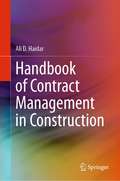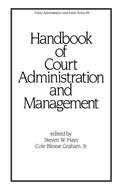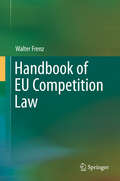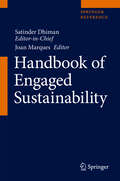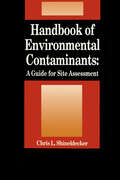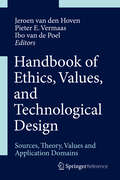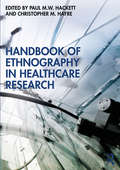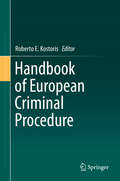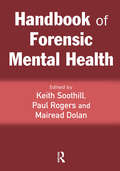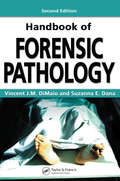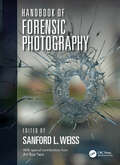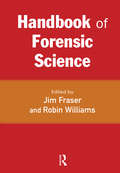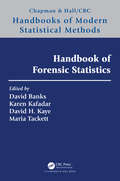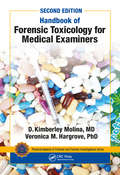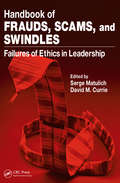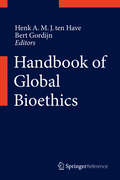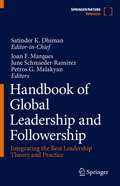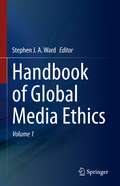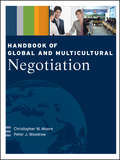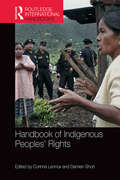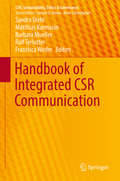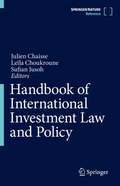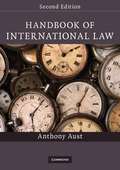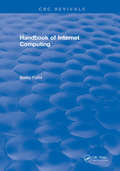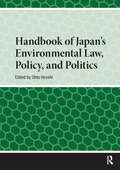- Table View
- List View
Handbook of Contract Management in Construction
by Ali D. HaidarThis book addresses the process and principles of contract management in construction from an international perspective. It presents a well-structured, in-depth analysis of construction law doctrines necessary to understand the fundamentals of contract management. The book begins with an introduction to contract management and contract law and formation. It then discusses the various parties to a contract and their relevant obligations, whether they are engineers, contractors or subcontractors. It also addresses standard practices when drafting and revising contracts, as well as what can be expected in standard contracts general clauses. Two chapters are dedicated to contract clauses, with one focused on contract administration such as schedules, payment certificates and defects liability, and the other focused on contract management, such as terminations, dispute resolutions and claims. This book provides a useful reference to engineers, project managers and students within the field of engineering and construction management.
Handbook of Court Administration and Management (Public Administration And Public Policy Ser. #49)
by HaysBlending both the theoretical and applied aspects of contemporary issues in court management, this reference/text offers in-depth coverage of all major topics and developments in judicial systems administration. It is suitable for use in the classroom or for self-study.;Providing the background material to clarify even the most technical management application, this book: presents the history and theory of the court management movement; examines the separation of powers doctrine, and its relationship to judicial independence; discusses the latest developments in court reform, the American Bar Association standards, alternative dispute resolution techniques and caseflow considerations; analyzes unified court budgeting and revenue generation by judicial systems; describes personnel administration, training and jury management; and elucidates court performance evaluation, planning approaches, the use of cameras in the courtroom and audio-visual applications.
Handbook of EU Competition Law
by Walter FrenzThis handbook offers detailed descriptions of EU competition law, including mergers and public authorities. Above all, it analyzes and discusses recent decisions of the ECJ and the General Court. Presenting systematically structured and theoretically founded content, the book also includes recommendations for practitioners. Special attention is paid to the scope of penalties and the influence on fundamental rights. Rounding out the book, the conflict between safeguarding confidential information and the effectiveness of private and public enforcement is discussed intensively in the context of the new Directive 2014/104/EU.
Handbook of Engaged Sustainability
by Satinder Dhiman Joan MarquesThis handbook is based on the premise that in order for sustainability to be sustainable, a profound psychological transformation has to take place at the individual and collective level. Focusing on the practice of environmental sustainability, this handbook will explore the application of sustainability in a wide variety of contemporary contexts—from economics of consumption and growth to government policy, sustainable cities, and sustainable planet. The editors believe that the way to achieve sustainable, harmonious living in all spheres is through lived or engaged sustainability at the personal, team, and organizational levels. It is impossible to separate economic development issues from environment issues. In its most practical aspect, sustainability is about understanding the interconnections among environment, society, and economy. This book aims to provide a comprehensive overview of current theories and approaches in the area of engaged sustainability for academics, researchers and practitioners. Specifically, it will focus on making responsible decisions that will reduce humanity’s negative impact on the environment. While various social and political initiatives for sustainability are welcome, one cannot really enact sustainability into legislative laws. Something has to change fundamentally at the level of a common person in the street. The Handbook of Engaged Sustainability acknowledges the classic literature, theories and principles in the area of sustainability, but also provides new theories and approaches from global scholars and practitioners in the field. It will also provide a well-structured pedagogical framework with real life case examples. The aim of this handbook is to expand the reader’s thinking to one of “big-picture awareness” and a “cosmic vision” of sustainability, a vision that extends from our neighborhoods to our communities, to states, countries, globe, galaxy, and envelops the entire Universe! This book will serve as an essential resource for researchers, scholars and students of sustainability, ethics, corporate social responsibility and environmental economics, as well as consultants, business and team leaders, and anyone interested in engaged sustainability.
Handbook of Environmental Contaminants: A Guide for Site Assessment
by Chris ShineldeckerHandbook of Environmental Contaminants: A Guide for Site Assessment is an indispensable working reference for environmental assessment professionals faced with determining potential environmental contaminants that might be found in the soil, groundwater, or air of a property or facility. The book provides a comprehensive listing of potential contaminants associated with hundreds of industries, activities, and processes. The types of properties covered range from agricultural to heavy industrial. The products and processes covered range from the processing of yeast to the constituents of rocket fuel. The book also discusses products associated with the degradation of common chemical solvents in the environment.Handbook of Environmental Contaminants: A Guide for Site Assessment is an important reference for environmental consultants, workers on Superfund sites, public health and safety professionals, attorneys, educators and students, and lenders.
Handbook of Ethics, Values, and Technological Design
by Ibo van de Poel Pieter E. Vermaas Jeroen van den HovenThis handbook enumerates every aspect of incorporating moral and societal values into technology design, reflects the fact that the latter has moved on from strict functionality to become sensitive to moral and social values such as sustainability and accountability. Aimed at a broad readership that includes ethicists, policy makers and designers themselves, it proffers a detailed survey of how technological, and institutional, design must now reflect awareness of ethical factors such as sustainability, human well-being, privacy, democracy and justice, inclusivity, trust, accountability, and responsibility (both social and environmental). Edited by a trio of highly experienced academic philosophers with a specialized interest in the ethical dimensions of technology and human creativity, this syncretic handbook collates an array of published material and offers a studied, practical introduction to the field. The volume addresses myriad aspects at the intersection of technology design and ethics, enabling designers to adopt a constructive approach in anticipating, preventing, and resolving societal and ethical issues affecting their work. It covers underlying theory; discrete values such as democracy, human well-being, sustainability and justice; and application domains themselves, which include architecture, bio- and nanotechnology, and military hardware. As the first exhaustive survey of a field whose importance is characterized by almost exponential growth, it represents a compelling addition to a formerly atomized literature.
Handbook of Ethnography in Healthcare Research
by Hackett, Paul M.W.This handbook provides an up-to-date reference point for ethnography in healthcare research. Taking a multi-disciplinary approach, the chapters offer a holistic view of ethnography within medical contexts. This edited volume is organized around major methodological themes, such as ethics, interviews, narrative analysis and mixed methods. Through the use of case studies, it illustrates how methodological considerations for ethnographic healthcare research are distinct from those in other fields. It has detailed content on the methodological facets of undertaking ethnography for prospective researchers to help them to conduct research in both an ethical and safe manner. It also highlights important issues such as the role of the researcher as the key research instrument, exploring how one’s social behaviours enable the researcher to ‘get closer’ to his/her participants and thus uncover original phenomena. Furthermore, it invites critical discussion of applied methodological strategies within the global academic community by pushing forward the use of ethnography to enhance the body of knowledge in the field. The book offers an original guide for advanced students, prospective ethnographers, and healthcare professionals aiming to utilize this methodological approach.
Handbook of European Criminal Procedure
by Roberto E. KostorisThis volume analyses criminal procedural issues from a European perspective, particularly in connection with EU law and ECHR law. As such, it differs from previous works, which, on the one hand, generally focus only on EU law, and, on the other, address both procedural and substantial aspects, as a result of which the former receive inadequate attention. Indeed, criminal procedural matters in the European context have now reached a level of complexity, but also of maturity, that shows the features of a great design, which, even if not yet defined in all its aspects, appears sufficiently articulated to deserve to be explained in a systematic way. The book offers a guidance for practitioners, academics and students alike. It covers a broad range of topics: from the complex system of the sources of law to the multilevel protection of fundamental rights; from vertical and horizontal judicial and police cooperation to the instruments of mutual recognition, primarily the European Arrest Warrant; but also the European Investigation Order, the execution of confiscation orders, the ne bis in idem principle, the conflicts of jurisdiction and the enforcement of judgements. The book also reflects the latest regulation on the establishment of the European Public Prosecutor’s Office.
Handbook of Forensic Mental Health
by Paul Rogers Keith Soothill Mairead DolanThis is a comprehensive reference book on the subject of forensic mental health, looking at what forensic mental health is and its assessment, management and treatment. It focuses on key topics and the issues underpinning them in contemporary society. The book includes: an account of the historical development of forensic mental health, along with a description of the three mental health systems operating in the UK an in-depth analysis of the forensic mental health process and system, including an analysis of the different systems applied for juveniles and adults an examination of the main issues in forensic mental health including sex offending, personality disorders and addiction a breakdown of the key skills needed for forensic mental health practice. This is an authoritative reference book which will be a crucial text for practitioners, academics and students in the forensic mental health field.
Handbook of Forensic Pathology
by Vincent J.M. DiMaio M.D. Suzanna E. Dana M.D.Handbook of Forensic Pathology, Second Edition is an up-to-date, concise manual illustrating all core aspects of modern forensic pathology. This edition retains the outline format of the original, which allows for quick access and rapid assimilation. Written in no-nonsense, easily understandable language, this precise and thorough yet compact resou
Handbook of Forensic Photography
by Sanford L WeissHandbook of Forensic Photography is the most-comprehensive, definitive reference for the use of photography in the capture and presentation of forensic evidence. The intent is to inform the reader about the most complete and up-to-date methods to capture and reproduce images that most accurately represent the evidence. With the rise in importance of forensic science, crime and accident scene documentation has likewise increased in importance—not the least of which has been forensic photography. The need to use accepted practice and protocols to guarantee the authenticity of images for evidence documentation is paramount for using it in court. And as with any discipline, there is an art to the science of forensic photography. Contributing authors from various backgrounds—each experts in their field—have provided numerous case examples, best practices, and recommendations for recognizing, recording, and preserving evidence using cameras and the latest digital image technology, including video and other imaging technologies. Chapters present such topics as videography, drone photography, underwater photography, crime scene photography, autopsy photographs, fire documentation, forensic odontology, and more. The book closes with coverage of courtroom displays, presenting imaging evidence and expert witness testimony in the courtroom. Handbook of Forensic Photography is a must-have reference for experienced crime scene photographers, death and crime scene investigators, police, and forensic professionals—including medical examiners, odontologists, engineers, and forensic anthropologists—who frequently need to capture investigative photographs in the course of investigations.
Handbook of Forensic Science
by Robin Williams Jim FraserForensic science has become increasingly important within contemporary criminal justice, from criminal investigation through to courtroom deliberations, and an increasing number of agencies and individuals are having to engage with its contribution to contemporary justice. This Handbook aims to provide an authoritative map of the landscape of forensic science within the criminal justice system of the UK. It sets out the essential features of the subject, covering the disciplinary, technological, organizational and legislative resources that are brought together to make up contemporary forensic science practice. It is the first full-length publication which reviews forensic science in a wider political, economic, social, technological and legal context, identifying emerging themes on the current status and potential future of forensic science as part of the criminal justice system. With contributions from many of the leading authorities in the field it will be essential reading for both students and practitioners.
Handbook of Forensic Statistics (ISSN)
by David Banks, Karen Kafadar, David H. Kaye and Maria TackettHandbook of Forensic Statistics is a collection of chapters by leading authorities in forensic statistics. Written for statisticians, scientists, and legal professionals having a broad range of statistical expertise, it summarizes and compares basic methods of statistical inference (frequentist, likelihoodist, and Bayesian) for trace and other evidence that links individuals to crimes, the modern history and key controversies in the field, and the psychological and legal aspects of such scientific evidence.Specific topics include uncertainty in measurements and conclusions; statistically valid statements of weight of evidence or source conclusions; admissibility and presentation of statistical findings; and the state of the art of methods (including problems and pitfalls) for collecting, analyzing, and interpreting data in such areas as forensic biology, chemistry, and pattern and impression evidence. The particular types of evidence that are discussed include DNA, latent fingerprints, firearms and toolmarks, glass, handwriting, shoeprints, and voice exemplars.
Handbook of Forensic Toxicology for Medical Examiners (Practical Aspects of Criminal and Forensic Investigations)
by D. K. Molina, M.D. Veronica HargroveForensic professionals, particularly medical examiners—often working through heavy caseloads—require quick and easy access to reliable sources of information to help interpret toxicology results. While several in-depth resources are available, they are often large, cumbersome, and contain more information than is often needed. The Handbook of Forensic Toxicology for Medical Examiners is a concise handbook referencing the most common toxic substances and their reported non-toxic, toxic, and lethal concentrations, making it an ideal text for quick reference in the lab or autopsy room. Features of the Second Edition: Explains the principles of postmortem toxicology and the factors which must be considered Provides tables of toxicologic data for over 200 commonly encountered substances, including drugs of abuse, poisons, prescription drugs, and over-the-counter medications Includes discussion and description of the novel psychoactive drugs—including synthetic opioids, cannabinoids, stimulants and hallucinogens Supplemental appendices provide additional information regarding specimen types and selection, testing methodologies, normal laboratory values, and conversion charts The busy forensic professional needs a concise handbook that provides critical information quickly and accurately. This heavily referenced text offers an easy-to-use format allowing for rapid access for both routine daily use and preparation for courtroom testimony.
Handbook of Frauds, Scams, and Swindles: Failures of Ethics in Leadership
by David M. Currie Serge MatulichIt has been said that scammers and swindlers often display characteristics commonly attributed to good leadership. These include setting a vision, communicating it clearly, and motivating others to follow their lead. But when these skills are used by unconscionable people to satisfy greed, how can the average person recognize that foul play is afoo
Handbook of Global Bioethics
by Bert Gordijn Henk A.M.J. ten HavePresents information and analysis concerning the state of affairs in bioethics in approximately 50 countries. In this title, readers can orientate themselves quickly as regards the various relevant issues, institutional structures and expertise available in these countries.
Handbook of Global Leadership and Followership: Integrating the Best Leadership Theory and Practice
by Satinder K. DhimanThis handbook integrates the best leadership and followership theories and practices between the Global North-West (countries of Western individualistic cultures in Europe, North America, Australia and Oceana) and the Global South-East (countries of Eastern collectivistic cultures in Asia, Africa, South America, and South-East Asian and Oceana). There is a need to bring the Global North-West and the Global South-East together to address global challenges such as the climate change, global hunger and poverty, domestic and international terrorism, social justice, gender inequality, and domestic and global abuse of human and natural resources. This innovative volume proposes that the democratic leadership of the Global North-West and the human-centered followership of the Global South-East can transform the world if leadership and followership values, education, and practices are integrated. It utilizes findings from positive psychology, social psychology, organizational behavior, and world religions and contemplative wisdom traditions to highlight the case for global leadership and followership.
Handbook of Global Media Ethics
by Stephen J. A. WardThis handbook is one of the first comprehensive research and teaching tools for the developing area of global media ethics. The advent of new media that is global in reach and impact has created the need for a journalism ethics that is global in principles and aims. For many scholars, teachers and journalists, the existing journalism ethics, e.g. existing codes of ethics, is too parochial and national. It fails to provide adequate normative guidance for a media that is digital, global and practiced by professional and citizen. A global media ethics is being constructed to define what responsible public journalism means for a new global media era. Currently, scholars write texts and codes for global media, teach global media ethics, analyse how global issues should be covered, and gather together at conferences, round tables and meetings. However, the field lacks an authoritative handbook that presents the views of leading thinkers on the most important issues for global media ethics. This handbook is a milestone in the field, and a major contribution to media ethics.
Handbook of Global and Multicultural Negotiation
by Christopher W. Moore Peter J. WoodrowPraise for Handbook of Global and Multicultural Negotiation"In today's globalized world, few competencies are as essentialas the ability to negotiate across cultures. In this insightful andpractical book, Chris Moore and Peter Woodrow draw on theirextensive global experience to help us understand the intricaciesof seeking to reach intercultural agreements and show us how to getto a wise yes. I recommend it highly!"William Urycoauthor, Getting to Yes, and author, The Power of a PositiveNo"Rich in the experience of the authors and the lessons theyshare, we learn that culture is more than our clothing, rituals,and food. It is the way we arrange time, space, language, manners,and meaning. This book teaches us to understand our own culture sowe are open to the other and gives us practical strategies tocoordinate our cultural approaches to negotiations and reachsustainable agreements."Meg Taylorcompliance advisor/ombudsman of the World Bank Group and formerambassador of Papua New Guinea to the United States of America andMexico"In a globalized multicultural world, everyone from thepresident of the United States to the leaders of the Taliban, fromthe CEO of Mittal Steel to the steelworkers in South Africa, needsto read this book. Chris Moore and Peter Woodrow have used theirglobal experience and invented the definitive tool forcommunication in the twenty-first century!"Vasu Goundenfounder and executive director, ACCORD, South Africa"Filled with practical advice and informed by sound research,the Handbook of Global and Multicultural Negotiation brings intoone location an extraordinary and comprehensive set of resourcesfor navigating conflict and negotiation in our multicultural world.More important, the authors speak from decades of experience,providing the best book on the topic to date-a gift toscholars and practitioners alike."John Paul LederachProfessor of International Peacebuilding, Kroc Institute,University of Notre Dame
Handbook of Indigenous Peoples' Rights (Routledge International Handbooks Ser.)
by Corinne Lennox Damien ShortThis handbook will be a comprehensive interdisciplinary overview of indigenous peoples’ rights. Chapters by experts in the field will examine legal, philosophical, sociological and political issues, addressing a wide range of themes at the heart of debates on the rights of indigenous peoples. The book will address not only the major questions, such as ‘who are indigenous peoples? What is distinctive about their rights? How are their rights constructed and protected? What is the relationship between national indigenous rights regimes and international norms? but also themes such as culture, identity, genocide, globalization and development, rights institutionalization and the environment.
Handbook of Integrated CSR Communication
by Sandra Diehl Matthias Karmasin Barbara Mueller Ralf Terlutter Franzisca WederThis handbook pursues an integrated communication approach. Drawing on the various fields of organizational communication and their relevance for CSR, it addresses innovative topics such as big data, social media, and the convergence of communication channels, as well as the roles they play in a successfully integrated CSR communication program. Further aspects covered include the analysis of sector-specific, cross-cultural, and ethical challenges related to the effective communication of CSR. This handbook is unique in its consistent focus on integrated communication. It is of interest not only for the scientific discourse, but will also benefit those corporations that not only seek to operate in a socially responsible manner, but also to communicate their efforts to their various stakeholders. Besides its significant value for researchers and professionals, the book can also be used as a reference for undergraduate and graduate students interested in successful CSR communication.
Handbook of International Investment Law and Policy
by Julien Chaisse Leïla Choukroune Sufian JusohThe Handbook of International Investment Law and Policy is a one-stop reference source. This Handbook covers the main conceptual questions in a logical, scholarly yet easy to comprehend manner. It is based on a truly global vision insisting particularly on Global South related issues and developments. In this respect, the Handbook of International Investment Law and Policy provides an excellent modern treatment of international investment law which is one of the fastest growing areas of international economic law. Professor Julien Chaisse, Professor Leïla Choukroune, and Professor Sufian Jusoh are the editors-in-chief of the Handbook of International Investment Law and Policy, a 1,500-page reference book, which is anticipated becoming one of the most influenced reference books in the international economic law areas. This Handbook is a highly comprehensive set of four volumes of original materials designed to cover all facets of international investment law and policy. The chapters, written by world-leading experts, explore key ideas and debates in relation to: international investment substantive law (Volume I), Investor-state dispute settlement (Volume II); interaction between international investment law and other fields of international law (Volume III); and, the new trends and challenges for international investment law (Volume IV). The Handbook will feature more than 80 contributions from leading experts (academics, lawyers, government officials), including Vivienne Bath, M. Sornarajah, Mélida Hodgson, Rahul Donde, Roberto Echandi, Andrew Mitchell, Ernst-Ulrich Petersmann, Christina L. Beharry, Krista Nadakavukaren Schefer, Leon Trakman, Prabhash Ranjan, Emmanuel Jacomy, Mariel Dimsey, Stavros Brekoulakis, Romesh Weeramantry, Nathalie Bernasconi-Osterwalder, David Collins, Damilola S. Olawuyi, Katia Fach Gomez, Jaemin Lee, Alejandro Carballo-Leyda, Patrick W. Pearsall, Mark Feldman, Surya Deva, Luke Nottage, Rafael Leal-Arcas, James Nedumpara, Rodrigo Polanco, etc. This Handbook will be an essential reference tool for students and scholars of international economic law. Policy makers and researchers alike will find the Handbook of International Investment Law and Policy useful for years to come.
Handbook of International Law
by Anthony AustAust (international and constitutional law consultant and former deputy legal adviser of the Foreign and Commonwealth Office, London) takes a "handbook" approach to the introduction of international law, aiming to explain the practical principles and rules of international law clearly and concisely, while avoiding theory and speculation as far as possible. He has also sought to utilize primary sources--treaties, judgments, and authoritative commentaries--as much as possible in his explanations. Chapters cover states and recognition; territory; jurisdiction; the law of treaties; diplomatic privileges and immunities; state immunity; nationality, aliens, and refugees; international organizations; the United Nations and the use of force; human rights; the law of armed conflict; international criminal law; terrorism; the law of the sea; international environmental law; international civil aviation; special regimes; international economic law; succession of states; state responsibility; settlement of disputes; and the European Union. The material is current as of July of 2009. Annotation ©2011 Book News, Inc., Portland, OR (booknews.com)
Handbook of Internet Computing (Internet And Communications Ser. #5)
by Borko FurhtScientists in different geographical locations conduct real-time experiments in a virtual shared workspace. E-commerce provides an emerging market for businesses large and small. E-mail, Servers, and Enterprise Resources Planning have revolutionized businesses on every level. People from all over the globe gather in chat rooms. The Internet is here to stay and Internet technologies and applications continue to grow and evolve.The Handbook of Internet Computing presents comprehensive coverage of all technical issues related to the Internet and its applications. It addresses hot topics such as Internet architectures, content-based multimedia retrieval on the Internet, Web-based collaboration, Web search engines, digital libraries, and more. Real-life examples illustrate the concepts so that technical, non-technical and business people can quickly grasp the fundamentals.
Handbook of Japan’s Environmental Law, Policy and Politics (Handbooks on Japanese Studies)
by Ohta HiroshiThis handbook offers an exposition of the contemporary status of Japan's environmental law, policy, and politics. The compass of ecological quandaries explored within this tome is expansive, encompassing issues pertinent to both natural and synthetic ecosystems, natural resources, and inorganic materials. Each chapter's temporal framework corresponds to the postwar period, following the enactment of environmental statutes and the initiation of administrative institutionalization, situated approximately in the early 1970s. The central inquiry addressed in this compendium pertains to the extent to which prevailing environmental statutes and policies have contributed to the enhancement or conservation of Japan's natural and synthetic ecosystems, as well as the resilience of its natural resources. The authors within this volume undertake an analysis to discern the causal factors behind the quandaries by ascribing them to the existence or absence of enforceable regulations, public involvement in policy formulation processes, bureaucratic fragmentation, pioneering regulatory measures, institutional obstacles, regulatory co-optation, rational cost-effective methodologies, scientific understanding, scientific communities, ecological commerce, environmental non-governmental organizations (NGOs), and holistic ecological plans and programs. Moreover, pertinent sections raise an inquiry concerning Japan's ecological diplomacy, inquiring whether Japan serves as a leader, bystander, or obstructionist.
